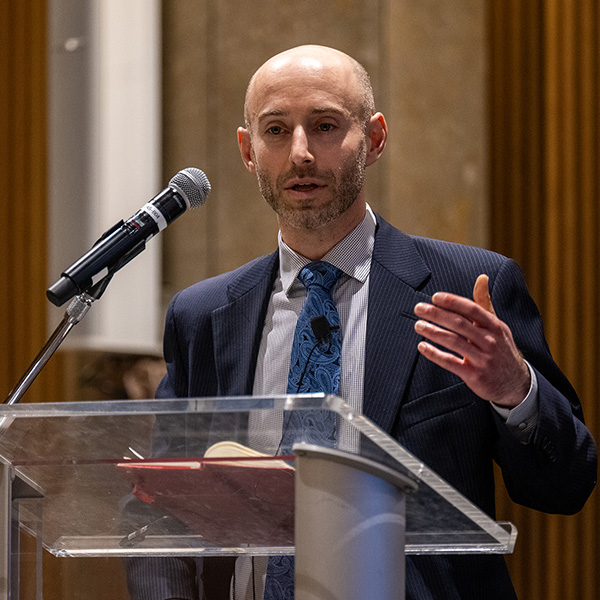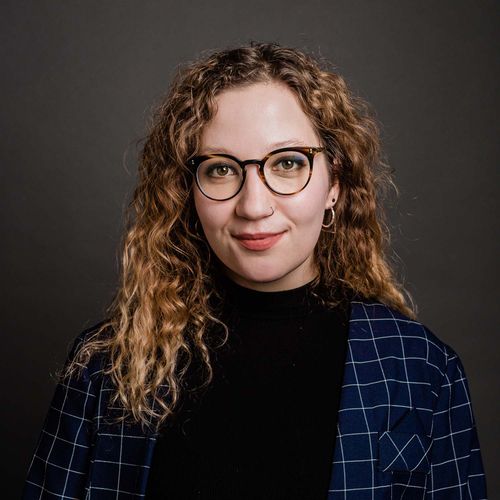Boston University Hosts Panel on Antisemitism at the Howard Thurman Center

At a panel Thursday at BU’s Howard Thurman Center February 13, panelists discussed antisemitism and other prejudices: Ron Hassner (from left), Kerice Doten-Snitker, moderator Jeremy Menchik, and Jonathan Feingold.
Boston University Hosts Panel on Antisemitism at the Howard Thurman Center
The latest offering in President Gilliam’s Living Our Values Project explores a subject that’s caused strife and debate on college campuses
Boston University held the latest offering in President Melissa L. Gilliam’s Living Our Values Project on Thursday: Antisemitism: Then and Now, featuring academics from across the country.
The panel was a collaboration with the Howard Thurman Center for Common Ground (HTC), the Frederick S. Pardee School of Global Studies Institute on Culture, Religion & World Affairs (CURA), and the Elie Wiesel Center for Jewish Studies, and was held at the HTC. The panelists were Jonathan Feingold, a BU School of Law associate professor, Kerice Doten-Snitker, a sociologist and postdoctoral fellow at the Sante Fe Institute, and Ron Hassner, a professor of political science and Israel studies at the University of California, Berkeley.
Jeremy Menchik, a Pardee associate professor of international relations and of political science and director of CURA, moderated the event, offering up four main questions to be considered: What are the origins of antisemitism? What are the most effective strategies for combating antisemitism? What are the connections and disconnections between other types of prejudices? How should DEI programs address antisemitism?
Pardee Dean Scott Taylor delivered the panel’s opening remarks. “Combating antisemitism is among the most challenging and pressing issues facing universities right now,” Taylor told the crowd. “Thanks go to the Howard Thurman Center for consistently being a home for hard and inclusive conversations around campus.”
Gilliam announced the Living Our Values Project during her 2024 inauguration speech. The project, she later wrote to the BU community, “will enable our campus community to identify and practice the core principles and beliefs that unite us all. These values can, in turn, guide our decisions, behaviors, and actions in ways that foster inclusivity, integrity, and positive impact.”
[The Living Our Values Project] will enable our campus community to identify and practice the core principles and beliefs that unite us all.
The project’s goals are to build the BU community’s discourse skills and create space for freedom of speech and expression. The inaugural Living Our Values event was an October 2024 town hall, where two BU working groups shared their recommendations on how to address bias and harassment based on geopolitical and religious identity on campus.
This latest event, with Pardee, follows in the footsteps of the town hall. The panel offered a historical overview of antisemitism, addressed current expressions of anti-Jewish sentiment, and explored ways to combat prejudice on campus and in the greater public discourse.
Each panelist was charged with addressing (more or less) one or two questions in their allotted time.
Doten-Snitker has researched medieval antisemitism in Europe, including what is now Germany, for over a decade. As a non-Jew, she told the audience, people are often surprised to learn about her research interests. “I like to say that I am studying how my Christian ancestors set up their societies to exclude and discriminate,” she said.
According to Doten-Snitker, the 14th and 15th centuries saw Christian governments become more interested in creating physical, economic, and legal borders in their territories, as well as the idea of elitist, theocratic rule. That led to instituting strict laws of separation between Christians and Jews regarding occupations, property ownership, and what kind of interreligious contact was allowed between households.
“Medieval governors faced ambiguous hierarchies of power and conflicting rights, and challenges for sovereignty that they attempted to solve through their policies towards Jews,” she said. “The Christian-religious understanding of Jews evolved to see Jews as a political threat…and medieval Christians constructed political and religious logic for making Jewishness appear to be a biologically inferior category.”
Feingold, an expert on anti-discrimination law, spoke about his frustrations with the ways language can be weaponized to create purposefully reductive narratives—such as if you advocate for Palestinian causes, you are automatically anti-Jewish—and to further discriminatory practices under the guise of combating discrimination (e.g., the successful effort to end affirmative action in college admissions).

“The work that I focus on is how for the past 60 or 70 years, anti-Democratic groups in the United States have been leading a campaign to roll back [our progress on equality] by co-opting the language of civil rights…to delegitimize the often quite modest policies that institutions employ to counteract racism,” he said.
Regarding antisemitism: the idea of protecting Jewish interests isn’t immune to being exploited for sinister purposes, Feingold said. As an example, he cited one right-wing influencer who famously called for conservatives to create a narrative associating Hamas with progressive groups like Black Lives Matter.
“In the same way that Asian-American identity was utilized [to end] affirmative action,” he said, “Jewish identity can be co-opted to adopt interventions focused on the wrong place.”
Hassner, faculty codirector of UC Berkeley’s Helen Diller Institute for Jewish Law and Israel Studies, grew up in Israel. (One of his privileges, he said: not being exposed to antisemitism until later in life.) He addressed zionism. Speaking about “then,” he said, one of the earliest antisemitic tropes was that Jews were “bloodthirsty” because they were bitter about not having a home—and that they didn’t deserve a home because of their role in the crucifixion of Jesus.
Returning to “now,” he said, a frequent question he gets from students is about the relationship between anti-Zionism and antisemitism. “Specifically, they ask, is anti-Zionism antisemitism? But what they mean: is criticism of Israel the same thing as antisemitism? And the answer is very clearly no,” he said. (Although the two can certainly overlap, he added.)
Specifically, [students] ask, is anti-Zionism antisemitism? But what they mean: is criticism of Israel the same thing as antisemitism? And the answer is very clearly no,” although the two can certainly overlap.
Part of the difficulty, Hassner said, is that “zionism” means different things depending on who’s using it. The encyclopedic definition of Zionism, he said, is Jews’ right to self-determination. “It’s easy to be critical of Israel 100 years back, or in the last 2 years, and not be antisemitic,” he said. “I think it’s much harder to be anti-Zionist in the true encyclopedic sense of the word: to deny Jews the right to self-determination.”
The evening ended with follow-up questions for each panelist from Menchik, and a brief audience Q&A session.
The panelists didn’t always agree on everything—such as on what students mean by the popular pro-Palestine chant “From the river to the sea”—but, they agreed, that’s the point of holding discussions like these and why the Living Our Values Project exists in the first place.
As Menchik told the audience in his introductory remarks: “The only nonnegotiable is that we debate in good faith.”


Comments & Discussion
Boston University moderates comments to facilitate an informed, substantive, civil conversation. Abusive, profane, self-promotional, misleading, incoherent or off-topic comments will be rejected. Moderators are staffed during regular business hours (EST) and can only accept comments written in English. Statistics or facts must include a citation or a link to the citation.